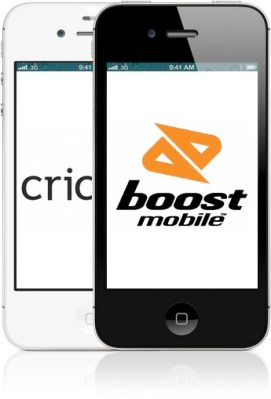Cricket Communications made waves yesterday morning when they announced that they would be the first prepaid carrier in the country to offer Apple’s iPhone, and now it seems that other contract-averse carriers may soon do the same.
TechnoBuffalo purports that Sprint-owned Boost Mobile will soon enter the fray by selling Apple’s little mobile juggernaut come “early September.”
Like Cricket, the Sprint subsidiary is said to sell the iPhone 4 and 4S, though there’s currently no word on what kinds of plans will be available for it should this launch come to pass.
Boost’s existing smartphone customers can pay either $55 or $60 per month for the company’s so-called “unlimited” plans — there’s a 2.5GB data cap in effect, and users are throttled once they tiptoe over the line — and much ado has been made about the company’s payment-reducing Shrinkage feature.
But why Boost? For a long time now, whenever the notion of a prepaid iPhone came up, it was usually connected to Sprint’s other mobile subsidiary: Virgin Mobile. Considering that Virgin Mobile has always been a bit more up-to-date when it came to their hardware offerings, the connection made a bit more sense, but Sprint has begun to pump much more effort into revitalizing Boost’s product lineup. Once a bastion of bulky chirp devices, Boost now sports as many Android smartphones as its flashier cousin carrier, so the notion that they would score the iPhone isn’t quite as farfetched as it used to be.
Regardless of whether or not this particular deal actually happens, one thing seems clear: the iPhone doesn’t live in an ivory tower any more. That may mean that the iPhone is no longer cool, especially given that the iPhone’s march onto other prepaid carriers will almost certainly happen, but in the end consumers won’t care.
Instead of having to choose between a handful of largely similar Android devices, those contract-averse will be able to get a slightly discounted iPhone on their own terms. That’s not a knock against Android — I’m admittedly an Android fanboy myself — but the iPhone has become an iconic mobile brand almost in the way the original RAZR has. Whether that’s good or bad depends on your interpretation, but this whole prepaid situation makes the iPhone more accessible to markets Apple may not have been able to crack before and there’s likely no turning back at this point.
